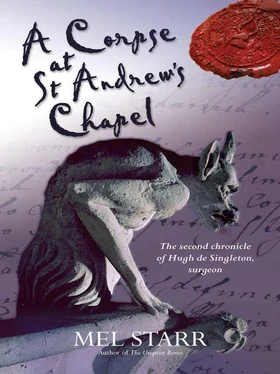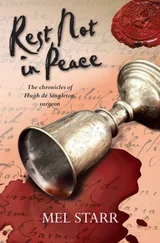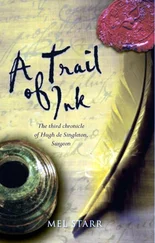Mel Starr - A Corpse at St Andrew's Chapel
Здесь есть возможность читать онлайн «Mel Starr - A Corpse at St Andrew's Chapel» весь текст электронной книги совершенно бесплатно (целиком полную версию без сокращений). В некоторых случаях можно слушать аудио, скачать через торрент в формате fb2 и присутствует краткое содержание. Год выпуска: 2010, Издательство: Kregel Publications, Жанр: Исторический детектив, на английском языке. Описание произведения, (предисловие) а так же отзывы посетителей доступны на портале библиотеки ЛибКат.
- Название:A Corpse at St Andrew's Chapel
- Автор:
- Издательство:Kregel Publications
- Жанр:
- Год:2010
- ISBN:нет данных
- Рейтинг книги:5 / 5. Голосов: 1
-
Избранное:Добавить в избранное
- Отзывы:
-
Ваша оценка:
- 100
- 1
- 2
- 3
- 4
- 5
A Corpse at St Andrew's Chapel: краткое содержание, описание и аннотация
Предлагаем к чтению аннотацию, описание, краткое содержание или предисловие (зависит от того, что написал сам автор книги «A Corpse at St Andrew's Chapel»). Если вы не нашли необходимую информацию о книге — напишите в комментариях, мы постараемся отыскать её.
A Corpse at St Andrew's Chapel — читать онлайн бесплатно полную книгу (весь текст) целиком
Ниже представлен текст книги, разбитый по страницам. Система сохранения места последней прочитанной страницы, позволяет с удобством читать онлайн бесплатно книгу «A Corpse at St Andrew's Chapel», без необходимости каждый раз заново искать на чём Вы остановились. Поставьте закладку, и сможете в любой момент перейти на страницу, на которой закончили чтение.
Интервал:
Закладка:
We splashed across to the north side of the brook (for here it flowed east, having turned from its southerly path through the town) and waited for the hounds to find the scent. They could not.
After much fruitless trotting about, their noses pressed to the ground, the fewterer called them to us. “Strange they cannot recover the trail. Squire can’t see so well in ’is old age, I think, but I never see ’im lose a scent.”
“Perhaps,” I suggested, “the animal passed through the brook for a few paces. If we follow downstream the dogs may find their way again.”
The fewterer leashed his hounds and led them along the north bank of the stream. Occasionally they frightened a trout from under the bank, but they gave no sign that they had recovered the scent.
We followed the brook for 200 paces or more, until the fewterer pulled at the leashes and turned to me. “Mayhap the beast left the brook on the other bank. If we find no track here we might return on the other side.”
I agreed, but was not ready to do so yet. We fought our way through brambles and undergrowth until we were nearly to Aston. The party did not complain, but as we continued east they more and more often peered at me with questioning eyes.
Perhaps the wolf had been this far east when I first heard it howl, but if so the dogs had found no trace of its presence. I spoke the words all were eager to hear, and we waded back across the brook to retrace our steps on the south bank.
The hounds seemed to enjoy this sport. They occasionally flushed a rabbit or a hedgehog. But when we arrived back where the trail had emerged from the wood to cross, as we thought, the brook, they had found no spoor to interest them. We had been three hours at our work, and were nearly back where we began.
The only course remaining was to seek the track upstream, toward the town. I directed that the hounds be separated, one dog on either side of the brook. As we set out I heard the bell from the Church of St Beornwald ring the ninth hour.
The dogs followed their noses up the brook all the way to Mill Street Bridge. They did not recover a scent. Tenants and villeins of Lord Gilbert Talbot and the Bishop of Exeter gazed in wonder as we clambered up the banks of the brook to the bridge. We made a rare spectacle. A dozen tired, mud-caked men, scratched and bloodied, and two weary old hounds. I was going to need another bath.
Hubert Shillside turned to me as we stood perplexed on the bridge. “I think,” he complained, “we must find better hounds. These are too old…they have missed the trail somewhere.”
This thought had occurred to me, but before I could reply the fewterer leaped to defend his charges.
“Nothin’ wrong wi’ the dogs. They’re not so young as t’run down a stag, maybe, but if there was a wolf left a trail they’d find it.”
“So you say, after Master Hugh heard the beast, and after the slain lamb, that there must be no wolf because your hounds cannot find it?” Shillside remarked sarcastically.
“’At’s what I’m sayin’. Master Hugh may’ve heard a wolf…no offense,” the fewterer looked at me and tugged his forelock. “But there be no trail or the dogs would’a found it.”
“But they did,” I said.
“Maybe,” the fewterer muttered.
“What is your meaning?” I challenged the old man.
“Oh, they found a scent. But t’were it a wolf they’d a been more eager to be off.”
“You are sure of this?”
“Nay. Can’t be certain. But I’ve worked Squire an’ Tawny since they was pups. I know ’em…an’ old or not, they didn’t act like they was on a trail of no wild beast.”
“Well, wolf or no, they are fatigued from the day’s labor, as are we all. Return them to their kennel and feed them well.”
“Will you be wantin’ ’em tomorrow?”
“No…unless there is better reason than we have found today.”
“What is to be done, then?” John Holcutt asked. “Must we hope the beast will travel on to curse some other place?”
“No. There may yet be a way to take this marauder. Take two or three others back to the meadow where the lamb lies. Build a screen downwind of the lamb. Tonight we will watch the meadow. Perhaps the wolf will return to its kill. You two,” I said to the archers, “will accompany the reeve and me tonight.”
Chapter 4
Our company broke apart, its dispirited members making their weary way to their homes, or, in John Holcutt’s case, to the meadow. Tomorrow there would be an all-night vigil at the church, awaiting Easter dawn and the removal of the cross from the Easter Sepulcher. Tonight we four would keep a vigil as well.
The two archers were known to me. They were tenants on Lord Gilbert’s land, and I had seen each put a dozen arrows into the butt end of a barrel at 200 paces. Unless John Holcutt built the screen well away from where the lamb lay, if the wolf returned this night he would find an unwelcome surprise. This thought reminded me that the time had come to renew the archery competitions Lord Gilbert sponsored on Sunday afternoons. Such contests were suspended for the winter, but ’twas time to renew the practice.
I ate a light supper, then made my way to the meadow where the reeve and his assistants were completing the screen. John had built a framework of saplings and fallen branches from the nearby wood. Into this he wove tall grasses which had withstood the winter, and ivy and foliage from the hedgerow. The blind was but two paces from the thistles and nettles of the hedgerow. No beast would come upon it from behind. The dead lamb lay forty paces west. No wolf who fed there this night would need another meal.
I sent the reeve and one archer to the castle for supper, and kept the other archer with me. It was not yet dark, but I did not wish both archers absent should the wolf return before they finished their meal. I would send the unfed archer to his supper later.
I might have sent them both with John, and kept a bow and arrows with me as I watched alone. But this would have been a mistake had the animal chosen that moment to return to its kill. If wolves laugh, the beast would surely have done so as any arrows I loosed fell wide of their mark.
John and the first archer returned, well satisfied, and I sent the other to his meal as the twilight faded. Only the outline of bare tree limbs was visible to the west, where the setting sun still gave illumination to the sky. By the time the second archer stumbled up to the blind from his supper, the meadow lay tenebrous under a starlit sky.
If a wolf had chosen to return then silently to finish its meal, we should never have seen it. But two hours later a waning moon rose over the greenwood to the east and the pale white carcass of the lamb became visible. It was undisturbed. I was uncertain whether to be pleased or regretful that we had not been visited in the dark.
We were not visited in the moonlight, either. One by one my companions fell asleep. Their steady, measured breathing was the only sound to break the silence of the night. I let them sleep. Unless they snored, as one of the archers was wont to do. A gentle kick usually brought him awake and stopped his rumbling. And the reeve woke from his slumber several times to watch with me. He may as well have slept, for no beast visited the meadow that night.
I sent my companions to their homes as the sun rose over the fields and forest to the east toward Aston. I required of each man that he rejoin me at the screen at sunset. I was unwilling to accept failure. There would be many others awake all this night in the church, keeping the Easter Vigil. We four would honor God by doing our duty to Lord Gilbert and the tenants and villeins of his manor.
I returned to my chamber in the castle and lay on my bed for a fitful sleep until dinner. I dreamed of pale blue yarn and wooden-soled shoes and slavering wolves.
Читать дальшеИнтервал:
Закладка:
Похожие книги на «A Corpse at St Andrew's Chapel»
Представляем Вашему вниманию похожие книги на «A Corpse at St Andrew's Chapel» списком для выбора. Мы отобрали схожую по названию и смыслу литературу в надежде предоставить читателям больше вариантов отыскать новые, интересные, ещё непрочитанные произведения.
Обсуждение, отзывы о книге «A Corpse at St Andrew's Chapel» и просто собственные мнения читателей. Оставьте ваши комментарии, напишите, что Вы думаете о произведении, его смысле или главных героях. Укажите что конкретно понравилось, а что нет, и почему Вы так считаете.












